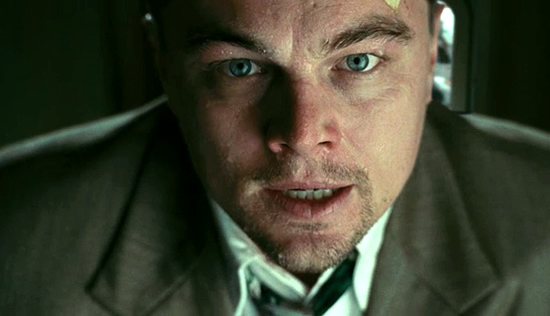
Leonardo DiCaprio in "Shutter Island"
Review: Scorsese’s ‘Shutter Island’ premieres at Berlin International Film Festival
There are plenty of themes in this year at the Berlin International Film Festival, the 60th anniversary of the annual event, but one that recurs – mostly like a nightmare – is that of the institution, the prison.
Shutter Island by Martin Scorsese, the most carefully monitored film at the festival for its world premiere, is set in 1954 in a hospital for the criminally insane on an island in Boston Harbor. Its a rough trip there under any circumstances, as we see when Leonardo DiCaprio and Mark Ruffalo set out by boat. They are FBI agents, investigating the disappearance of an inmate. Of course, theyre trapped, and the story flips into something altogether different.
If the dark-and-stormy-night weather werent unsettling enough, theres a sense of foreboding when the guards of the imposing brick complex warn the agents of the rules of the island that even the FBI must to obey. Then they meet the warden, Ben Kingsley, and you immediately get the message from his British accent and camp commander demeanor that any sense of realism here is going to be overwhelmed by drama and style, and by the sheer grandness of the project. Think of it as an opera or symphony in its sheer scale and in the demands that it aspires to place on your emotions.

Shutter Island
Unlike Mystic River, Clint Eastwoods neighborhood thriller adapted from the novel by the writer of Shutter Island, Dennis Lehane, this film takes you far beyond Boston. This isnt The Departed. Its a world unto itself, a multi-leveled hell of movie lore.
The soundtrack is crucial here, especially because its not in keeping with a period film. Music by Krzysztof Penderecki, Gyorgy Ligeti, John Cage, and John Adams isnt just dissonant, its cerebral. Its not only telling you that the world in this brick healing and correctional institutional is more fractured than the exteriors indicate.
Theres something going on inside these walls and inside these characters, and its going to get inside you.

Leonardo DiCaprio and Michelle Williams in "Shutter Island"
Bear in mind that this is from the man who brought you Travis Bickles fantasies in Taxi Driver. If that werent clear enough from the story, the music sounds as if somethings being pried open. It takes you back to horror films from as early as the 20s classic the Cabinet of Doctor Caligari. Once again, Scorsese is the encyclopedic cinephile.
The only thing missing in this horror thriller is the dissecting table – I did mention that the investigation and the music are prying open something sinister. That table here is the editing booth, and a whole range of films are being taken apart and assembled into this one.
Shutter Island puts you off balance – there seems to be a clear motivation for what DiCaprios character is doing as a former shell-shocked WW2 veteran (who shot Germans after they surrendered at a Nazi death camp) now trying to find the man who allegedly killed his wife (Michelle Williams) by burning down the familys house.
Then you find that we dont know what really happened, and the elaborate structure of history from World War II to CIA Cold War brain experiments on the island might not be pointing to what you think. I wont give it away. Lets say it ends up as a nightmarish drama in DiCaprios head.

Leonardo DiCaprio and Emily Mortimer in "Shutter Island"
Scorsese doesnt take you there through special effects – this isnt Avatar or Lord of the Rings — but through script, music and the design of an emotional gothic landscape where even the weather and the rocks act in opposition to the agents who probe the islands secrets. Its melodramatic, fright-crazy and stylish. At times the interiors of the asylum buildings look like places you could only see in a movie, unless youre around 19th century dungeons and oubliettes. (Think of the underground chambers in the Gangs of New York.) The reality of the setting isnt what counts here, but the reality of your emotions.
The 1950s have been called the Age of Anxiety (by W. H. Auden), for the horror of the eras politics. But ultimately his film is more about cinema than about the horrors of mental asylums or about the politics of the day. As with Inglorious Bastards, Shutter Island ends up being less frightening than you might have expected because have more to do with the world of movies than they do with the world itself.
Scorsese didnt take his cast through the old institutions of Massachusetts for them to see what the places were like. Yet he did show them classics like Laura, Out of the Past and Vertigo to acquaint them with the cinema of the time.
Ultimately Shutter Island becomes more about its director making a film than about anything during The Age of Anxiety. The movie shows its seams, quite deliberately, because its about film as an infrastructure. We see Scorsese working as an architect rather than as a magician. And the emotional experience that you have evolves into a preoccupation about how the craftsman is going to put it all together again – theres an emotional first hour, and then puzzlement about resolution takes over after that.
Indulge your appetite for movie nostalgia, and Shutter Island just might work.
